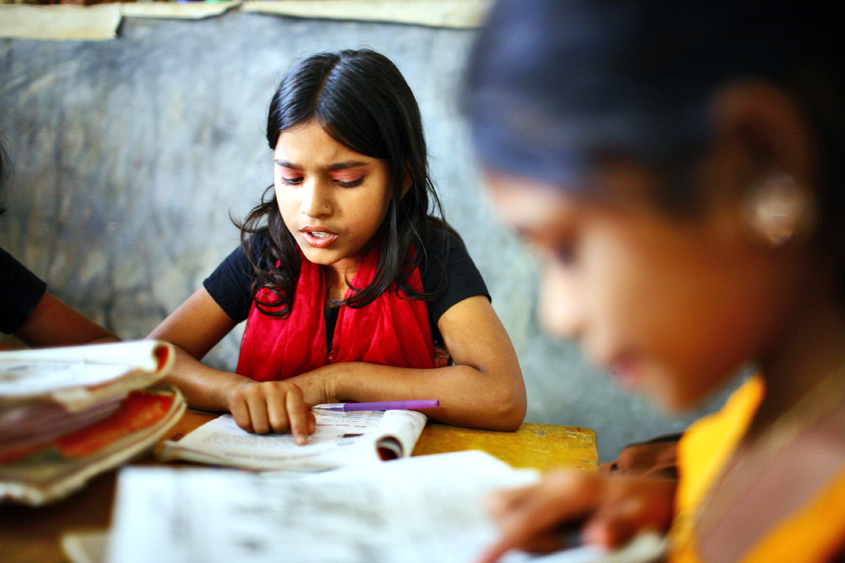Sesame Workshop in India (SWI) is working to facilitate basic academic and life skills by bringing high quality educational content to wherever children take up learning: preschools, classrooms, neighborhoods, their own homes. “Our content celebrates India’s rich cultural diversity and delivers lessons of literacy, numeracy, health, and emotional well-being to children between the ages of zero to eight and their families,” a spokesperson says.
The non-profit educational organisation behind Galli Galli Sim Sim, which uses the power of media to help children grow smarter, stronger and kinder, launched their crowdfunding campaign to raise funds in order to help around 6,000 kids studying in Delhi’s government schools to learn how to read.
“We initiated this project called “Learn to Read”, it’s actually based on the report published by the Delhi government that states that the quality of education in our country is really deteriorating and that we need to fix it on a war footing. The report states how a class VI student is unable to even read properly. So the whole campaign is structured around helping these kids with decent reading skills,” says Rakhi Miglani, Resource Mobilisation, Sesame Workshop India.
Miglani futher added, “Although we wanted to help a large number of kids but thought of starting with a small sample of 6000 so that we could closely monitor the progress. So we made a package of eight phonic books to ensure that kids can aim for a better understanding of things. Besides this, we are also training around hundred teachers who will help us carry the classes forward.”
Explaining why crowdfunding was selected to fund the workshop, Miglani says, “We, at Sesame, have never gone out looking for funding as most of our projects that are running across several states in India have big sponsors already. But for this project we chose to do so, as we wanted more people to be part of the donor network so that they could also feel responsible for helping these kids.”
Each of the 6000 kids will be provided with a kit that costs Rs 250, and includes eight books and a phonic phone that will help these kids not only understand what they read but also increase their speed and comprehension skills.
“We initiated this project called Learn to Read, it’s actually based on the report published by the Delhi government that states that the quality of education in our country is really deteriorating and that we need to fix it on a war footing. The report states how a class VI student is unable to even read properly. So the whole campaign is structured around helping these kids with decent reading skills.”
The formative years between 0-8 years are crucial for the development of the physical, intellectual, linguistic, emotional and social needs of a child. 90% of a child’s brain development takes place in these early years. Yet there is minimal awareness among policymakers, civil society organizations, parents, teachers and caregivers about the importance of Early Childhood Care and Education.
There are many national (ASER) and state-level reports which highlight the low learning levels of children and how a large chunk of children can’t read as per grade-levels. This can be rectified by providing access to high-quality education in the early years of a child’s upbringing which these days in our country only focus on rote learning instead of trying to understand concepts or build healthy habits. There is a need for the government to start providing priority budgeting to address early childhood education in India.
“Since 2006, we have reached over 100 million children across the nation through a combination of television, radio, and innovative community engagement programs to help them prepare for school and for life. Through our various outreach programs in the areas of financial empowerment, nutrition, sanitation, digital-education, pre-literacy skills and many more, we have seen a positive impact on the holistic development of children. The uniqueness of our model lies in our 360 degree approach of combining the power of media with the beloved Galli Galli Sim Sim muppets in order to reach all children, providing them access
The Galli Galli Sim Sim television program is broadcast on the national public broadcaster (DD National), and on regional channels such as DD Girnar [Gujarati], DD Sayadri [Marathi]), Hindi belt channels (DD Bihar, DD Rajasthan, DD Bhopal and DD Lucknow) and the cable and satellite (C&S) channel Pogo. The television series is currently in its seventh season and is watched by approximately 18 million children per year, across terrestrial and C&S viewers2. The show has earned loyal viewership among children as well as adults, indicating a high rate of educationally beneficial co-viewership.

